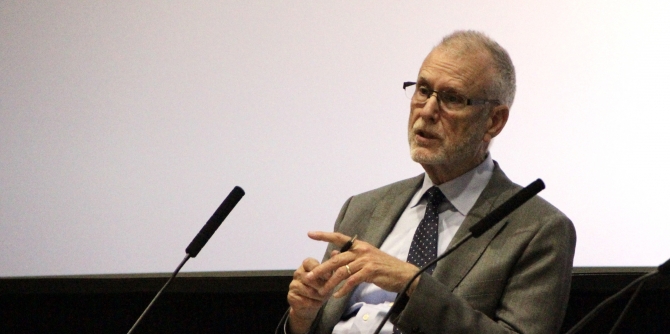MSc student Denise Baron reflects on Professor Richard Nisbett’s talk “Culture and Intelligence” and discusses his thoughts on whether humans are indeed getting smarter and what the possibilities are for increasing the rate of growth of human intelligence.
 When making arrows in the spring is it best to use ash tree saplings or locust tree branches?
When making arrows in the spring is it best to use ash tree saplings or locust tree branches?
What’s the best tool to use to fix a broken telegraph key?
Thankfully, these aren’t questions that LSE’s social psychology students will encounter during their exams next month. Rather, these are questions from IQ tests designed (respectively) for 19th century Plains Indians and the US Army in 1915.
Richard Nisbett, a renowned thinker, Professor of Social Psychology and Co-director of the Culture and Cognition program at the University of Michigan at Ann Arbor, recently delivered a lecture at LSE on “Culture and Intelligence.” MSc students might remember his work on actor/observer perspectives of attribution, but when he was here, Nisbett focused our attention on a deceptively simple question: Are humans getting smarter?
As highlighted by the IQ tests Nisbett used to begin his lecture, our understanding of intelligence is fundamentally entangled with our culture, and our cultural differences (such as socio-economic factors) can produce widely varying intellects. Even an attempt at a “culture-free” IQ test that uses black and white shapes in logic games is mired in culture and heavily contextualized by the culture within which it is administered. Thus, if culture can greatly impact how smart humans are, then what does that mean for the general intelligence of our current society? Or even that of future societies?
To explain this, Nisbett directed our attention back to the Industrial Revolution in order to understand how cultural change can generate or increase intelligence. He stated that the technological advances of that era enabled people to not only be healthier and wealthier, but also smarter. From the development of the scientific method to the industrialization of printed materials, the changes of the Industrial Revolution produced a sharp increase in the general intelligence of western societies.

So what does that mean for the brainpower of today’s increasingly global society?
Nisbett suggested that we are on the cusp of a major advancement in intelligence. The Information Revolution is providing cultures with new tools to share and augment information. And yet, he said, we haven’t fully taken advantage of these new tools to the extent of their potential. From artificial intelligence to quantum computer, our cultures have not yet harnessed the informational and technological advances of our time to benefit and increase the intelligence of the general public. These advances might be five years off or decades away, but as Nisbett suggests, the potential is there.
And so, from this lecture, I’d say the question is less about individual humans and more about cultures or collections of humans. We should be asking “are cultures getting smarter?” And according to Nisbett, the answer is a resounding “yes.” In fact, we’re living in an era of immense intellectual potential.
Denise Baron is currently a MS c candidate in Social Psychology at the London School of Economics. Before coming to LSE, Denise worked in American politics, both as a campaign saffer and communications consultant. Denise’s MSc research focuses on the impact of nostalgia on political communication and national identity.
c candidate in Social Psychology at the London School of Economics. Before coming to LSE, Denise worked in American politics, both as a campaign saffer and communications consultant. Denise’s MSc research focuses on the impact of nostalgia on political communication and national identity.





